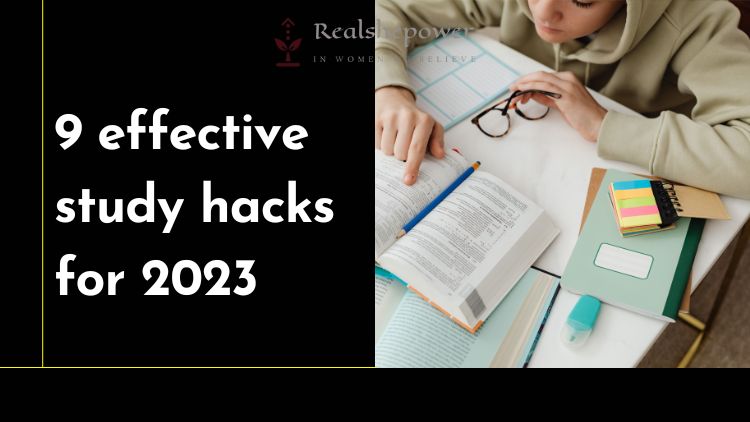9 Proven Study Hacks for Successful Learning in 2023


Introduction
Studying can often feel overwhelming, especially as the pressure to perform well increases. However, with the right approach, studying can become more manageable and even enjoyable. In this article, we will go over 9 effective study hacks for 2023 that will help students make the most of their study sessions and improve their grades.
Table of Contents
List of 9 Proven Study Techniques for the Year 2023
- Make a study schedule:
- Plan out your study sessions in advance, including breaks.
- Make sure to allocate enough time for each subject.
- Stick to the schedule as much as possible.
- Use active learning techniques:
- Practice explaining concepts to someone else.
- Try teaching the material to a study partner.
- Create flashcards or quizzes to test your knowledge.
- Minimize distractions:
- Turn off your phone or use apps to block distracting websites.
- Choose a quiet, well-lit study environment.
- Avoid multitasking while studying.
- Find your ideal study environment:
- Experiment with different study environments, such as the library or a coffee shop, to find what works best for you.
- Make sure the environment is conducive to concentration and focused learning.
- Use acronyms and mnemonics:
- Create memorable acronyms or mnemonics to help you remember key concepts or information.
- For example, to remember the order of planets, use the acronym “My very eager mother just served us nine pizzas”.
- Break up study sessions:
- Take short breaks every hour to rest your mind and avoid burnout.
- Use the Pomodoro Technique, where you study for 25 minutes and take a 5-minute break.
- Test yourself frequently:
- Regularly test your knowledge to reinforce what you have learned and identify areas where you need improvement.
- Use self-quizzes, practice exams, or study groups to test your understanding.
- Create a study group:
- Form a study group with classmates to review course material and discuss difficult concepts.
- Share tips, strategies, and resources with each other.
- Get adequate sleep:
- Make sure to get enough sleep, as lack of sleep can negatively impact concentration and memory.
- Establish a consistent sleep schedule and avoid staying up late to study.
Explore These 9 Proven Study Techniques in Greater Depth
1. Make a study schedule:
- Plan out your study sessions in advance, including breaks. This will help you stay organized and focused, and avoid feeling overwhelmed.
- Make sure to allocate enough time for each subject. Consider the amount of material you need to cover, the difficulty of the subject, and the amount of time you need to review and reinforce the information.
- Stick to the schedule as much as possible. Try to avoid procrastination and distractions, and make the most of your study time. If you need to make changes to your schedule, do so thoughtfully and deliberately, rather than just giving in to temptation.
2. Use active learning techniques:
- Practice explaining concepts to someone else. This can help you clarify your own understanding of the material, and also allows you to see the subject from a different perspective.
- Try teaching the material to a study partner. This can help you feel more confident about the material and reinforce your own understanding of it.
- Create flashcards or quizzes to test your knowledge. This can help you identify areas where you need improvement, and also reinforce your memory of the information.
3. Minimize distractions:
- Turn off your phone or use apps to block distracting websites. This will help you stay focused and avoid the temptation to check social media, email, or other distracting sites while you’re studying.
- Choose a quiet, well-lit study environment. Find a place where you can concentrate without being interrupted or distracted by noise or other people.
- Avoid multitasking while studying. Focus on one task at a time, and avoid trying to study and do other things at the same time.
4. Find your ideal study environment:
- Experiment with different study environments, such as the library or a coffee shop, to find what works best for you. Everyone is different, so it’s important to find an environment that works for you and helps you stay focused and productive.
- Make sure the environment is conducive to concentration and focused learning. This might mean finding a place with minimal distractions, good lighting, and comfortable seating.
5. Use acronyms and mnemonics:
- Create memorable acronyms or mnemonics to help you remember key concepts or information. These memory aids can be a helpful tool for retaining information and recalling it later.
- For example, to remember the order of planets, use the acronym “My very eager mother just served us nine pizzas”. This acronym can help you remember the order of the planets in our solar system (Mercury, Venus, Earth, Mars, Jupiter, Saturn, Uranus, Neptune, Pluto).
- Mnemonics and acronyms can help you associate the information with a memorable phrase or image, making it easier to recall later.
- You can also create mnemonics to remember lists, dates, formulas, or other types of information.
- Try creating your own acronyms and mnemonics that are meaningful and relevant to you. This can help you remember information more effectively and make it easier to recall later.
- For example, to remember the names of the Great Lakes, you could use the mnemonic “HOMES” (Huron, Ontario, Michigan, Erie, Superior).
6. Break up study sessions:
- Take short breaks every hour to rest your mind and avoid burnout. Taking breaks can help you stay focused and productive, and also prevent you from feeling overwhelmed or fatigued.
- Use the Pomodoro Technique, where you study for 25 minutes and take a 5-minute break. This technique can help you stay focused and avoid distractions, and also allow you to take regular breaks to recharge and refresh your mind.
7. Test yourself frequently:
- Regularly test your knowledge to reinforce what you have learned and identify areas where you need improvement. This will help you gauge your understanding of the material and identify areas where you need to spend more time reviewing.
- Use self-quizzes, practice exams, or study groups to test your understanding. These can be helpful tools for reinforcing your memory and testing your knowledge, and can also help you feel more confident about the material.
8. Create a study group:
- Study groups can be a great way to reinforce your understanding of the material, get support from your peers, and stay motivated.
- Work together with classmates or friends who are also studying the same material. This will allow you to share information, discuss concepts, and compare study techniques.
- Make sure the study group is focused and productive. Establish ground rules for the group, such as staying on topic, avoiding distractions, and being respectful to each other.
- Take turns leading the study sessions, and encourage everyone to participate. This can help keep everyone engaged and focused, and also help you build teamwork and leadership skills.
9. Get adequate sleep:
- Getting enough sleep is crucial for your academic success as it directly affects your ability to concentrate and remember what you have learned.
- Studies have shown that a lack of sleep can impair your cognitive functions, making it difficult for you to process new information and retain memories.
- To ensure that you get adequate sleep, it’s important to establish a consistent sleep schedule and stick to it as much as possible. Try to go to bed and wake up at the same time every day, even on weekends, to train your body to get into a sleep rhythm.
- It’s also important to avoid staying up late to study. Although it might seem like a good idea to use the extra time to study, it’s actually more productive to get a good night’s sleep and come back to your studies refreshed and ready to learn.
Valid questions to ask yourself include:
- How does my study environment affect my focus and productivity?
- What active learning techniques work best for me?
- How often should I test my understanding of the material?
- How much sleep do I need to feel rested and alert?
Conclusion:
By implementing these 9 effective study hacks, students can achieve their full potential in their studies. Whether it’s finding the right environment to study in or using mnemonics to remember key concepts, there’s a study hack out there for everyone. By staying organized, minimizing distractions, and making the most of their study time, students can succeed in their academic pursuits.
Read: 9 Surprising Truth About Adulthood: Lessons I Wish I Knew as a Teenager

You can now write for RSP Magazine and be a part of the community. Share your stories and opinions with us here.
